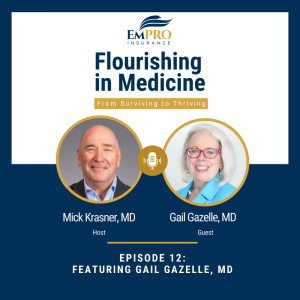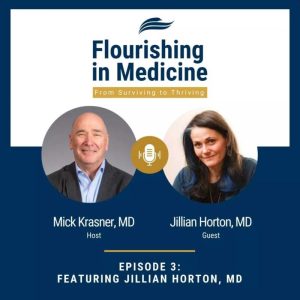Flourishing in Medicine: From Surviving to Thriving
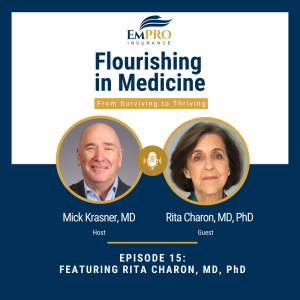
Episode 15: Activism and Empathy in Medicine: Dr. Rita Charon on Narrative Competency (published August 17, 2024)
Hosted by Mick Krasner, MD
Rita Charon, a pioneer in narrative medicine, merges her backgrounds in general internal medicine and literary scholarship to enhance medical practice. With an MD from Harvard and a PhD in English from Columbia, she holds several prestigious positions at Columbia University, including founding the Department of Medical Humanities and Ethics. Her work, supported by major institutions like the NIH and NEH, emphasizes the integration of narrative theory in medicine to improve patient care and clinician well-being. In this interview, Dr. Charon discusses how literature informs medical practice, emphasizing the importance of narrative competence in addressing the emotional and systemic challenges in healthcare, particularly in times of crisis like the COVID-19 pandemic.

Episode 14: Building Institutional Resilience: Dr. Helen Riess on Empathy and Support in Medicine (published 7/11/2024).
Hosted by Mick Krasner, MD
Our guest today is Helen Riess, M.D., Chief Scientist and Chairman of Empathetics and Associate Clinical Professor of Psychiatry at Harvard Medical School. She developed an empathy training approach based on neurobiology and physiology research, tested in a randomized trial at Massachusetts General Hospital (MGH), where she also directs the Empathy and Relational Science Program. Dr. Riess, an author and core member of the Consortium for Research on Emotional Intelligence in Organizations, emphasizes the importance of empathy, self-care, and supportive organizational cultures to combat burnout among healthcare professionals. Influenced by her family’s experiences as refugees, she believes empathy is a mutable trait and advocates for institutional resilience through safe environments, caring communication, community cohesion, and mental health normalization.

Episode 13: Mindful Healing: Dr. Ellen Langer’s Approach to Well-being (published 6/5/2024).
Hosted by Mick Krasner, MD
The guest for this podcast Ellen Langer, PhD, Professor of Psychology at Harvard University, a Fellow of The Sloan Foundation; The American Psychological Association, the American Psychological Society, The American Association for the Advancement of Science; Computers and Society; The Society for the Psychological Study of Social Issues; The Society of Experimental Social Psychologists. She has been awarded a Guggenheim and the Liberty Science Genius Award among many others. In addition to her many honors, she has been a guest lecturer in Japan, Malaysia, Germany, and Argentina.
In this conversation, a rich exploration unfolds of the intersection between mindfulness and healthcare, beginning with Dr. Langer’s personal journey into health studies, catalyzed by a miraculous recovery in their family. This narrative weaves through the profound influence of the mind-body connection, drawing on examples like the “Counterclockwise Study” to underscore the potential for psychological factors to significantly impact physical health. She advocates for a healthcare approach that recognizes the unity of mind and body, emphasizes the importance of mindfulness beyond meditation, and addresses the dynamic nature of health with a flexible, engaged attitude towards patient care. The discussion also highlights the challenges of conventional medicine’s problem-focused approach, proposing a shift towards leveraging patients’ strengths and capacities through mindful observation to variability. By illustrating how mindfulness can transform both personal experiences and professional practices, the conversation champions a healthcare paradigm that values meaningful connections and fosters an environment of non-judgment and safety, suggesting a communal shift towards a more mindful, holistic view of health and well-being.
Episode 12: From Surviving to Thriving Episode 12 From Burnout to Flourishing: Insights from Dr. Gail Gazelle (published 5/3/2024).
Hosted by Mick Krasner, MD
This episode’s guest, Dr. Gail Gazelle, with 25 years as a practicing internist and hospice physician, combines practical, evidence-based strategies with her extensive medical and mindfulness expertise. She is a recognized figure in the media, featured in outlets like CNN, NPR, Oprah Magazine, and has been published twice in the New England Journal of Medicine as well as other leading medical journals.
Gail defines mindfulness in terms of awareness and mind training. In addressing health professional burnout, she stresses the need to focus on present moment experiences and work with what is-how things actually are- accepting the current state in healthcare as lived reality as an honest and workable starting point for transformation. She also explores the impact of stories in our professional lives, differentiating between helpful stories that add meaning and purpose to our work and unhelpful narratives that keep us stuck with an unrealistic and unworkable view of ourselves and our situations. Finally, the conversation touches on the transformative power of flourishing in healthcare, both as a recipient of healthcare and as a provider of care to others.

Episode 11 (published 4/11/2024).
Hosted by Mick Krasner, MD
This episode delves further into medical education by featuring Malayna Hocker, a 4th Year Medical Student who discusses her non-traditional journey into medicine and her evolution into a teaching and advocacy role. Initially deterred from the medical field due to negative childhood experiences in hospitals, Malayna explored alternative careers before her passion for science and community service led her back to medicine through teaching in challenging environments. Her experiences in these roles, particularly facing student violence and family issues, shaped her perspective and teaching focus, which now includes advocating for a shift in medical culture towards openness, empathy, and collaboration. Malayna emphasizes the importance of breaking the traditional cycles of isolation and shame in medical training, fostering supportive environments to combat burnout, and maintaining personal fulfillment both within and outside the medical profession.
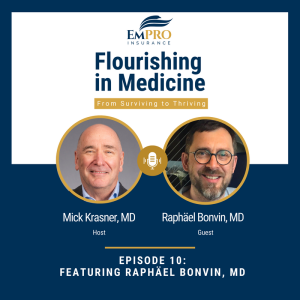
Episode 10 (published 3/28/2024).
Hosted by Mick Krasner, MD
Featuring special guest Dr. Raphael Bonvin, Vice President of Education, Section of Medicine at the Université de Fribourg-Universität Freiburg and Professor of Medical Education, Fribourg, Switzerland. Raphael has been and remains an agent of positive change in medical education, contributing to positive professional identity formation of physicians at a critical period of their educational and career journey.
Dr. Raphael Bonvin shares his journey from an initial interest in physics and biochemistry to focusing on medical education, influenced by early training in traditional Chinese medicine. He advocates for a shift in medical education towards formative assessments and programmatic assessment approaches, emphasizing the importance of holistic evaluation beyond traditional grading, promoting student reflection, and addressing key competencies such as self-awareness and self-care to cultivate resilient and well-prepared physicians.

Episode 9 (published 3/13/2024).
Hosted by Mick Krasner, MD
Featuring special guest Ghazal Radwi, MD, hematologist and transfusion medicine specialist for Transfusion Medicine for North Sector at Alberta Precision Laboratories, and a Clinical Assistant Professor in the Department of Laboratory Medicine and Pathology at the University of Alberta, Edmonton. She also collaborates with the Office of Advocacy and Well-Being at the University of Alberta to help develop programs that support physician well-being.
In this podcast, Dr. Radwi, shares her journey into medicine, influenced by her father and driven by a sense of calling. The conversation delves into the challenges faced by health professionals in Alberta, Canada, addressing political turbulence, burnout, racism, and trauma within the healthcare system. Dr. Radwi emphasizes the importance of trauma-informed approaches in medical training, advocates for transparency in leadership, and highlights the significance of joy and play in fostering teamwork and professional well-being within the medical field.
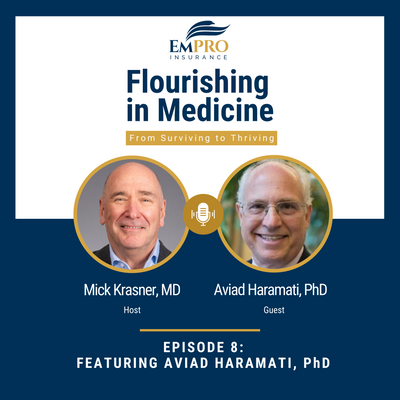
Episode 8 (published 2/27/2024).
Hosted by Mick Krasner, MD
Featuring special guest Aviad Haramati, PhD, Professor of Integrative Physiology and co-director of the Graduate Program in Integrative Medicine & Health Sciences at Georgetown University Medical Center
In this podcast Dr. Haramati shares his unique journey from studying physiology to becoming a leader in mind-body medicine education. The pivotal moment occurred during a meeting at Harvard Medical School, where he realized the importance of medical education professional training, leading him to integrate mind-body medicine into the Georgetown curriculum. He further discusses the transformation in medical education and the evolving understanding of the importance of self-care for medical professionals. Recently, he has introduced a new course called the Course on Human Flourishing, which aims to provide strategies for thriving in medical school and life. Sharing personal experiences as an educator, Dr. Haramati highlights the joy derived from helping students discover their potential and the satisfaction of making a positive impact on medical education.
.
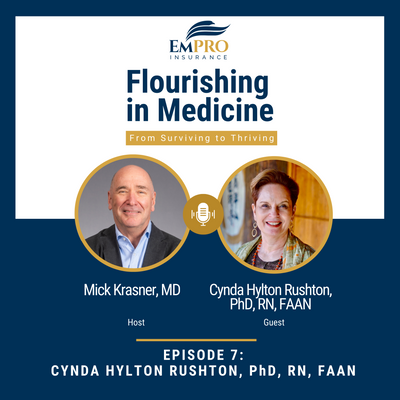
Episode 7 (published 2/14/2024).
Hosted by Mick Krasner, MD
Featuring special guest Cynda Hylton Rushton, PhD, RN, FAAN
Cynda discusses her natural gravitation towards nursing, highlighting her passion for patient care shaped by early experiences and significant moments, such as her involvement in the Being with Dying program at the Upaya Zen Center, which profoundly influenced her patient care approach. She explores the role of contemplative practices in enhancing healthcare, detailing the creation of the Mindful Ethical Practice and Resilience Academy (MEPRA) to combat nurse burnout and promote ethical practice, while emphasizing moral resilience as crucial for maintaining integrity amidst moral challenges.
Episode 6 (published 1/29/2024).
Hosted by Mick Krasner, MD
Featuring special guest Colin West, MD, PhD
In this insightful podcast episode, we welcome Dr. Colin West, MD, PhD, Professor of Medicine, Medical Education, and Biostatistics at the Mayo Clinics. Serving as the Director of the Mayo Clinic Program on Physician Well-Being, Dr. West’s research, extensively published in renowned journals, delves into medical education and physician well-being. The interview explores Dr. West’s personal journey into medicine, emphasizing the critical link between physician well-being and enhanced patient care. His dedication to understanding and addressing the challenges faced by healthcare professionals, particularly physicians, sheds light on the humanistic aspect of medicine and advocates for creating a healthier work environment within the healthcare field. The discussion underscores the interconnectedness of physician well-being and excellent patient care, forming a virtuous cycle that Dr. West believes should be a central focus in the response to the pressures faced by health systems and organizations.
Episode 5 (published 1/22/2024).
Hosted by Mick Krasner, MD
Featuring special guest Christine Runyan, PhD
I am so excited to share with you my conversation with Dr. Christina (Tina) Runyan, who is a clinical psychologist, previously a professor of in the department of family medicine at the University of Massachusetts Medical School, and now with Tend Health, a company she co-founded that provides specialized, private, and accessible mental health care and education to healthcare professionals and consultation to healthcare organizations willing to invest in their most precious resource. An expert on health professional and especially physician stress, she finds that being valued and finding a place of value within the healthcare ecosystem is central to being able to sustain energy, quality, motivation, and well-being. Her translation of the effects of stress on us individually and collectively in healthcare, long a challenge given the nature of the work we do facing into suffering and uncertainty, and heightened by the pandemic, helps normalize and appreciate the ways our nervous systems are doing exactly what they were designed to do. And she outlines ways we as individuals and the health care system itself can bring capacities already present on-line to help restore and recover our well-being. A strong admirer of and advocate for health professionals, I am sure you will find this discussion uplifting.
Episode 4 (published 12/28/2023).
Hosted by Mick Krasner, MD
Featuring special guest Tim Cunningham, RN, DrPH, MSN, FAAN
Dr. Tim Cunningham, Vice-President of Practice and Innovation at Emory Healthcare in Atlanta, discussed his diverse career as a nurse, public health doctoral graduate, and professional clown. Serving as co-chief wellness officer at Emory, he has contributed to the well-being discourse in healthcare. Cunningham’s experiences include clinical work in trauma centers, humanitarian crises such as the Ebola outbreak, and authoring “Self-Care for New and Student Nurses.” In the podcast, he shared personal reflections on burnout, emphasizing the importance of meaning in preventing it. Cunningham discussed challenges in his role, advocating for evidence-based leadership innovation, and predicted a future where investing in medical staff well-being becomes a clear imperative. His unique perspective draws parallels between clowning, theater, and healthcare, underscoring the significance of creating space for healing in the medical profession.
Episode 3 (published 10/12/2023).
Hosted by Mick Krasner, MD
Featuring special guest Jillian Horton, MD
Dr. Jillian Horton, a general internist and medical educator at the University of Manitoba’s Max Rady College of Medicine, discussed her extensive career and diverse roles in medical education, receiving recognition for mentorship and teaching. Co-author of the graphic novel “Medicine” and author of the bestselling memoir “We Are All Perfectly Fine,” Dr. Horton shared personal insights on mindfulness, the challenges of medical education, and the importance of bringing humanity to healthcare. In the podcast, she reflected on her family’s influence, identified Hawkeye Pierce from MASH as a survival role model, and challenged conventional notions of joy in medicine, emphasizing foundational needs, humanism, and the significance of deep listening and presence in medical encounters.
Episode 2 (published 10/24/2023).
Hosted by Mick Krasner, MD
Featuring special guest Ronald Epstein, MD
In this podcast episode, Dr. Ronald Epstein, a renowned physician, educator, and researcher, discusses his work on mindfulness and communication in medical practice. With over 300 scholarly articles and his book, “Attending: Medicine, Mindfulness and Humanity,” Dr. Epstein explores how health professionals can build strong connections with patients and colleagues while optimizing patient care and resilience. He emphasizes the importance of cultivating presence in the medical context and reflects on the balance between flourishing, joy and suffering in healthcare. Dr. Epstein also highlights the need for healthcare professionals to take responsibility for their sustainability and find meaning in their work, acknowledging the imperfections in the healthcare system.
Episode 1 (published 09/28/2023).
Hosted by Mick Krasner, MD
Featuring special guest Ni-Cheng Liang, MD, ATSF
Dr. Ni-Cheng Liang, a cancer survivor and pulmonary physician, discussed her passion for integrative therapies like mindfulness meditation, acupuncture, and yoga, which have played a crucial role in her quality of life after surviving cancer. During the conversation, she emphasized the reciprocal relationship between healers and patients, addressed the challenges of time constraints in medical work, and how mindfulness practices help create space and slow down time. Dr. Liang also stressed the significance of finding joy and meaning in medicine, mentioning that joy, connection, and gratitude serve as healing balms in healthcare. Additionally, she shared insights into her work with the Mindful Healthcare Collective, a project she co-founded to support healthcare professionals’ well-being during the pandemic, emphasizing the importance of self-healing in the healing profession.

